Ghee is a kitchen staple in Indian kitchens and is becoming more prominent in the West as its virtues continue to be revealed. As a full-body balm, it is a panacea.
Ghee is a form of highly-clarified butter which is traditionally used in Asian cooking. Like butter, ghee is usually made from cow’s milk. Ghee is made by melting regular butter. The butter separates into liquid fats & milk solids. Once separated, the milk solids are removed, which means that ghee has less lactose compare to butter. Traditionally, desi ghee has been used as cooking oil, an ingredient in dishes, and in Ayurveda therapies. Desi ghee is still used in Ayurvedic massage and as a base for herbal ointments to treat burns and rashes.
Nutritional Benefits
Ghee is known as a substance which gives longevity due to its many health benefits. These health benefits are by far superior, if the ghee is made from the milk of pastured cows. The time of year is also important as the most nutrient dense ghee is made from the raw milk taken from desi cows feeding on lush spring grass.
Some of the nutritional content includes
- Vitamin A which is important for the immune system, skin health, detoxification of certain compounds such as polychlorinated biphenyls and for the strengthening of bones.
- Vitamin E, an excellent antioxidant.
- Vitamin K2, which is required to move calcium into the bones & teeth helping to reduce osteoporosis and cavity formation.
- CLA (Conjugated linoleic acid), which has been shown to assist with weight loss and reduce the risk of diabetes and certain cancers.
- Vitamin D which is required for the absorption & bone utilisation of calcium, assists to coordinate the immune system to balance autoimmune conditions and fight infections, reduces the risk of cancer & cardiovascular disease and is involved in genetic expression resulting in orchestrating hundreds of metabolic processes.
- Butyric acid (Butyrate), a short chain fatty acid which helps to support healthy insulin levels and is anti- inflammatory. Butyrate has been shown to be particularly beneficial for those with IBS (Irritable Bowel Syndrome), Crohn’s and Ulcerative Colitis.
- Choline is an amino acid that prevents fat from being stored in the liver and is therapeutically used for non-alcoholic fatty liver disease. It is also a precursor for acetylcholine, an important neurotransmitter involved with memory and muscle contraction.
Read our blog – Why The Pure Desi Cow Milk Ghee Is Costlier Than Normal Ghee?
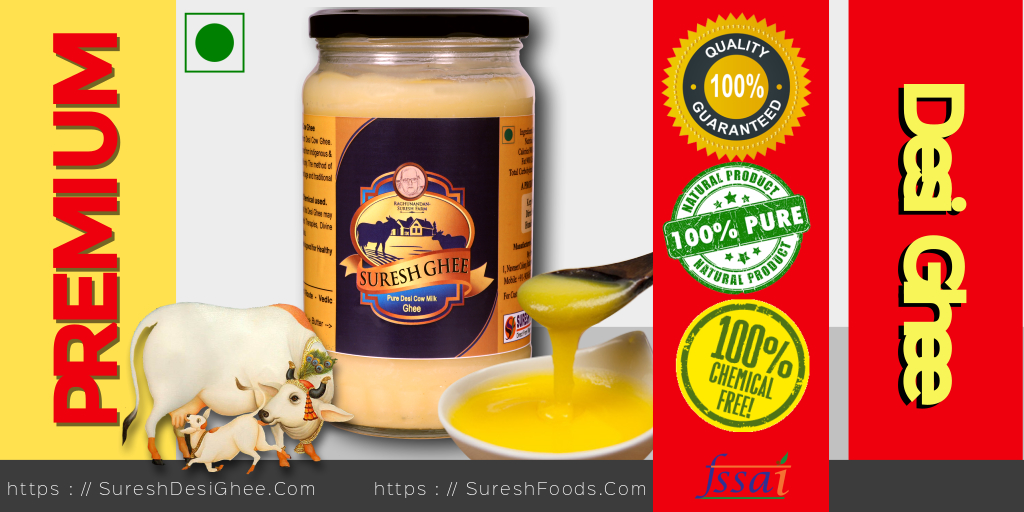
Buy Pure Desi Cow Ghee Online : Order Now. Free Shipping
Ghee is better for high-heat cooking than butter since it has a smoke point of between 392 °F and 482 °F, as compared with about 350 °F for ordinary butter. Ghee is commonly used in cooking Indian food & can be used whenever butter or oil is used in most recipes. Simply melt desi ghee and then spread it on bread for a tasty snack or drizzle it over vegetables prior to roasting. Ghee can also be swapped for vegetable oil or coconut oil while making baked goods.
Desi ghee is not just used in cooking but also acts as medicine. It is often used as a nourishing oil for massage or after baths. Consuming desi cow ghee enhances the capabilities of the brain like memory, wisdom, and intellect. We’re sure that you must be hearing all kinds of positive things about consuming ghee. Some say that consuming ghee can have side effects on your health but this is not true. However, consuming it in inappropriate portions is unhealthy. Now, let’s take you through some advantages of desi cow ghee that makes it healthy and safe to consume.
Heals and Nourishes Body
Desi Cow Ghee is also known for its healing qualities. Ghee is the best thing to apply on skin burns or sun burns. We have been hearing elders emphasising to use desi cow ghee for hair as it is it helps to cure dryness and relieves flaky scalps. As the winters arrive, make sure to stock up on your desi cow ghee for skin. It is always recommended since it is considered a great moisturiser that not only heals skin but also cracked lips and heels.
Low In Fat
If you have problems with cholesterol, ghee is a healthier option compare to butter as it is low in fat. It is also easier to digest due to this reason. Research has shown that ghee can reduce cholesterol in the intestine as well as the serum . If you are looking for a good source of healthy fats, desi ghee is your best option as it is almost made up of saturated fat.
Tackles Hair Problems
Ghee contains essential fatty acids which make it a great choice for your hair care. It works as a natural moisturiser due to the presence of vitamin A, soothes dry or itchy scalp and dandruff as well. Also, massaging your hair with desi ghee for 15 to 20 minutes increases blood circulation and boosts the thickness of the hair.

Is Beneficial For Skin
Daily consumption and application of desi cow ghee can be greatly beneficial to your skin.
- Ghee is a good moisturizer – lightly massage your skin with ghee to get supple and soft skin in the winters.
- chapped lips? Smear a bit of desi ghee on your lips and get a luscious pout without using cosmetics.
- Lack of sleep may be leaving panda-like dark circles around your eyes, but ghee will reduce them in no time. Apply ghee lightly around the eyes before going to sleep.
- Burns or rashes heal quickly if you apply desi ghee as a ointment.
Good For Babies
Is ghee safe for babies? Yes, it is if taken in limited amounts. When babies/kid are not dependent on mother’s milk, they begin to lose weight. So, giving them desi ghee can help them gain weight and maintain it. Ensure that you feed babies one teaspoon of desi ghee per day. In addition, massaging babies with desi ghee will keep their bones strong and healthy.

Has Anticancer And Anti-Inflammatory Properties
According to researchers, butyrate enemas & oral butyrate supplements can be used for the effective treatment of diseases that cause inflammation in the bowels, such as ulcerative colitis and Crohn’s disease. Ghee is also naturally rich in CLA (conjugated linoleic acid) if it is prepared from cows that are grass-fed.
Animal studies with CLA have shown improvement in insulin resistance and the potential to fight cancer. However, more research is required to understand this acid’s interaction with humans. Also, it is believed that a high concentration of butyric acid, which has anti-viral properties, can inhibit the development of cancerous tumors.
How Much Ghee Can You Consume A Day?
Healthy individuals should consume 1 tablespoon of desi cow ghee per day to reap all of the benefits. Remember, ghee is entirely saturated fat, just make sure that you do not have it in large amounts. Moderation is the key while having ghee.
What Are The Healthiest Ways To Consume Desi Cow Ghee?
- Use desi cow ghee instead of coconut oil or olive oil for baking..
- Swap butter for desi ghee while having with steamed rice.
- Use ghee instead of any other cooking oil for sautéing & roasting
Ways to Consume Desi Cow Ghee
Prefer ghee for roasting pavs as a substitute of butter : If someone has run out of butter while cooking pav bhaji, opt for ghee to roast the pavs instead. Also, they might actually taste finer and if in any case, there’s enough butter in the bhaji already during cooking. Just for further information, ghee counts over butter on multiple fronts.
Cook the tadka for dal with fragrant ghee : Everyone will require a second helping of your tedious dal if you make a flavourful tadka adding ghee,cumin seeds and curry leaves. Pour over steaming hot dal for the better finishing touch and a lingering aroma.
Consume a teaspoon before going to bed : If someone doesn’t prefer the way ghee alters the flavor of your favorite foods, consume a teaspoon by itself before going to bed. Consider it in this manner, ghee is known to diminish body heat or pitta, as it is commonly known in Ayurveda.
Utilize ghee to prepare delicious, flaky sweets : We as people don’t require much knowledge in this regard but if the inflation factor encourages you to substitute oil while making sweets, cease. It’s beneficial spending a little more and opting ghee to make your halwas and sweet dish instead.
Mix with herbs and use as a batter for fish or chicken : Blend warm ghee with fragrant herbs and seasonings and utilize this as a wonderful batter for fish and chicken. Also, it might even gel along with pasta sauces.
Prepare flavourful soups along with ghee : Instead of the butter prefer stirring in ghee into creamy soups to make them more brim with flavor and aroma. Either it is a tomato, cream of onion or just simple mushroom soup, ghee will never fail to impress you.
Opt ghee as a substitute for butter while baking : Any moment of time a baking recipe signals for butter, you can opt ghee instead. Sooner one will be churning out wonderfully moist delicious cakes and other cuisines with the splendor of ghee.
Consider adding a generous drizzle of ghee over chapatis and parathas : If you’re avoiding the ghee on your chapatis to decrease weight, you’re doing it wrong. Drizzle Some drops of ghee on your chapatis and rotis might benefit your case. Considering ghee to roast parathas is also much more beneficial than oil.
Ghee is one of the best media for cooking since it has a very high smoke point (204ᵒC) and its chemical structure does not change with heat. Ghee stimulates acid secretion in the stomach and aids in digestion.
β-carotene and vitamin E present in ghee are well-known antioxidants which helps in reducing free radical damage in the body thus protecting us from several life style diseases besides helping to prolong the shelf-life of ghee at room temperature.
Ghee is loaded with vitamin A which helps in keeping the outer lining of eye ball moist and prevents blindness. It is effective in healing of wounds and ulcer of the intestinal tract. It is also effective for treating skin rashes and burns on the body. Ghee taken regularly in small doses is invaluable as it not only increases the digestive capacity but also nourishes the weak.
‘Too much is too bad’ holds good for ghee also. If you wish to know how much is too much, consider this. When ghee is consumed at levels of 10% of total intake of calories.

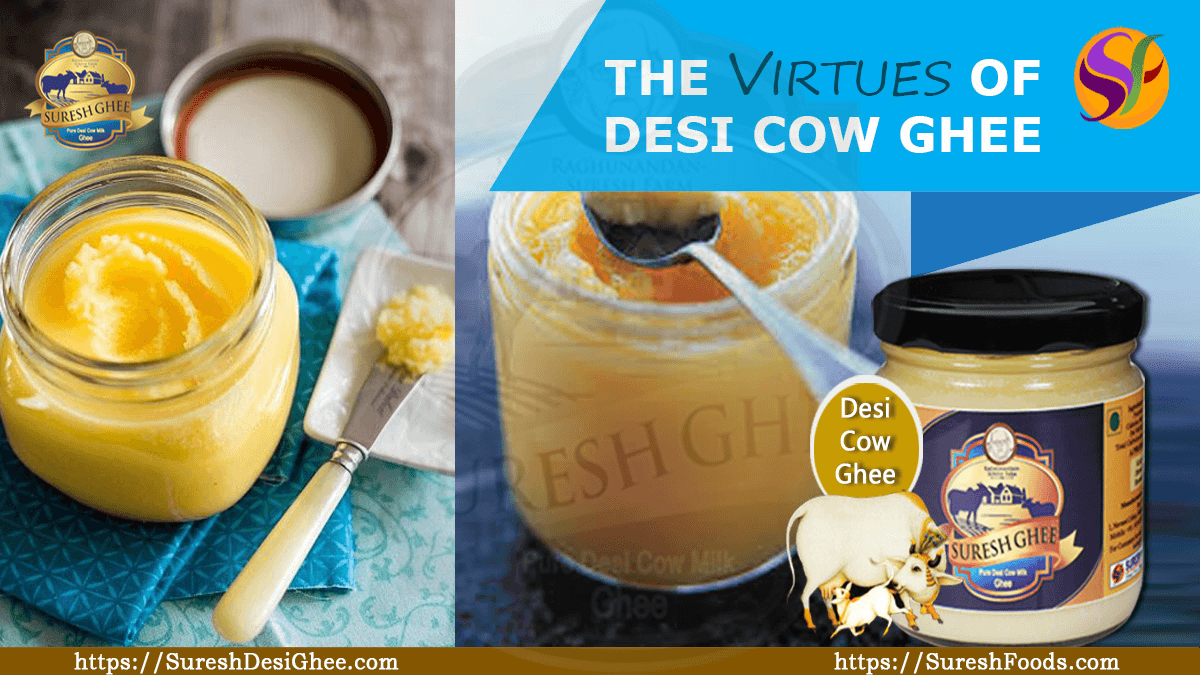
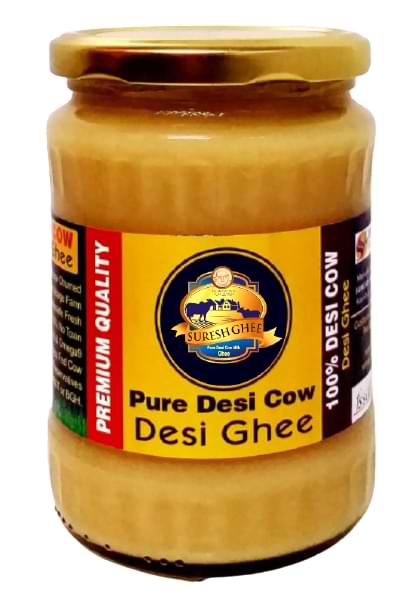
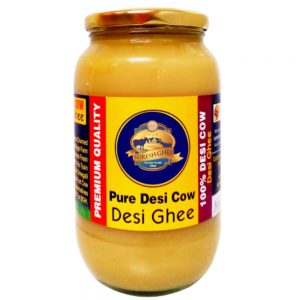
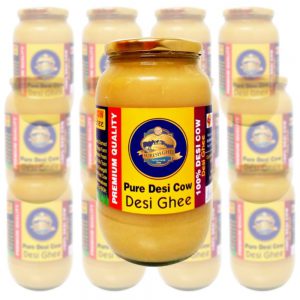
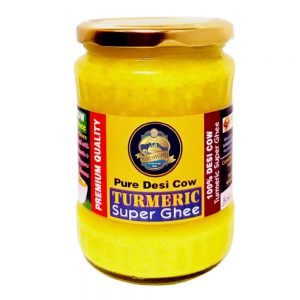
 WhatsApp us
WhatsApp us 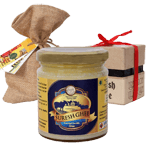
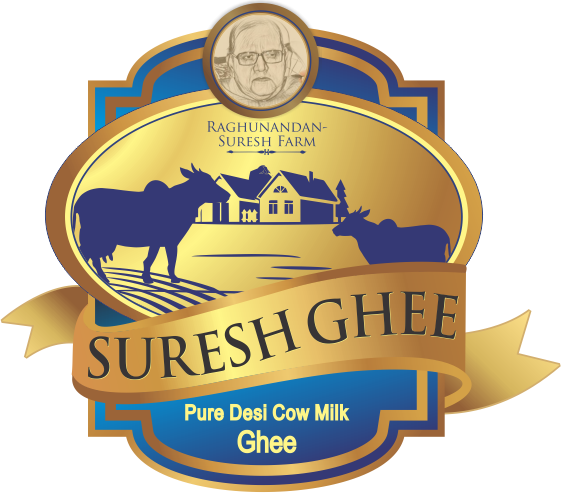
Naveen m...